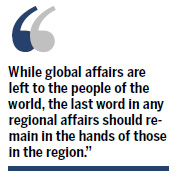US
US gunboat policy and its hidden agenda
By Luo Yuan (China Daily)
Updated: 2010-08-18 16:53
 |
Large Medium Small |
BEIJING - The claim by US Secretary of State Hillary Clinton at the last ASEAN forum that the US has national interests in the South China Sea has stunned the world. By claiming its freedom of navigation in the area, she really means the right of the US to show its power and to spy on China.
In the Naval Operations Concept 2010 document, signed by US President Barack Obama on May 25, six core areas are emphasized.
These give a clear and vivid description of so-called US marine interests: forward presence, deterrence, maritime safety, control of the sea, power projection and humanitarian aid.
But what is the hidden agenda?

Forward presence means nothing more than extending the US safety boundary to the doors of other countries; deterrence refers to aggression when it doesn't get its way.
As for maritime safety, the US turns a blind eye to the safety of no other country but itself. The real meaning behind control of the sea is to control the whole world through the seas.
Regarding power projection, it is a war force rather than a peace force that is being projected and emphasized by the US. And US humanitarian aid is provided to only Americans or its allies. For others, it's not aid but threats and strikes.
The US hidden intention to pursue Cold War mentality and gunboat policy is revealed clearly in the operations concept document.
Though Clinton seemingly called for talks and consultations rather than threats or the use of force to address disputes at the forum, it misses by a mile. What she rejects during the forum is just what the US has done to the Korean Peninsula.
People should never be surprised at the US as it has always practiced double standards.
If a bigger picture is taken, it can be seen that US deployment has been adjusted and its strategic focus is being shifted to the Asia-Pacific region.
It has built a three-chain-and-a-circle strategic system to block China.

The first chain runs through the Japanese archipelago, Ryukyu Islands, Taiwan and the Philippines, where the US has strengthened the mobility of its troops in the Republic of Korea (ROK) and has accelerated its military integration with Japan.
It has also enhanced its strategic deterrence power and attack capability in the second chain along the volcanic islands, Ogasawara Islands, Guam and Mariana Islands.
The third chain reaches Hawaiian Islands, where it emphasizes force projection and defense capability.
Meanwhile, another F-22 stealth fighter was recently dispatched to Hawaii to join two others in Guam and Alaska, and three newly upgraded Ohio-class SSGN-726 nuclear submarines - in Busan in the ROK, Subic Bay in the Philippines and Diego Garcia in the Indian Ocean - have completed the circle off the Chinese sea area.
In addition, the ever-increasing multilateral joint military drills and traditional bilateral ones conducted by the US and its partners have greatly deteriorated the security situation of the Pacific Rim.
The first island chain is enough to explain why the US has insisted on interfering in affairs in the Asia-Pacific region.
Its ultimate military intent is to confine China and squeeze the big elephant into an ant. While the three of its five allies - Japan, the ROK and the Philippines - are included in the first chain, Taiwan, which is not among the US ally group, has been turned into an unsinkable aircraft carrier in threatening Beijing through arms sales.
In an era of flourishing multi-polarization and globalization, US gunboat policy is just going the opposite of the historical trend of peace and equality.
Although the policy brought the US military successes in Iraq and Afghanistan, more sticky problems have yet to be solved.
Troops will be withdrawn sooner or later after the conquest, but to solve the mess left is no easy task.
It's high time for the US to change its way. While global affairs are left to the people of the world, the last word in any regional affairs should remain in the hands of those in the region.
Similarly, people should have the final say on their national affairs. Since it is no easy to handle domestic affairs, the US should stop its gunboat policy and leave other countries and regions alone.
The author is the deputy secretary-general of the Society of China Military Sciences.
For China Daily